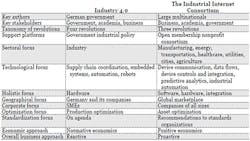Industry 4.0 vs. the Industrial Internet: A Primer
Spend a few days at any conference, a few hours with any tech magazine or, better yet, a few minutes clicking through pretty much any website and you will hear, read and see the buzzword of this year.
The Internet of Things.
The IoT will be everywhere, we’re told, with at least as many as 25 billion connected devices within the next five years, and perhaps more than 200 billion if everything works well and growth remains exponential for a little while longer. It will improve efficiency and help us run our lives, or perhaps it will just run our lives, period. Either way, there will be no escape short of building a cabin in the woods and extracting yourself from society like Thoreau or Kaczynski.
But there is another buzzword — at least in the manufacturing sector — that is just as prevalent. Industry 4.0 (Industrie 4.0 in Germany) is uttered by those who understand many of its nuances and by those who are only now starting to get a grasp on what it means. And if you haven’t been paying attention the last couple of years, you might just use them interchangeably. No big deal, right?
Wrong. There is a considerable difference between the Internet of Things (as well as the Industrial Internet of Things, or The IIoT) and Industry 4.0. Dr. Kris Bledowski of the MAPI Foundation recently published a paper —The Internet of Things: Industrie 4.0 vs. the Industrial Internet — breaking down those differences. Print it out and refer back often, if necessary, because we really don’t think you’ll be building a cabin any time soon.
Industry 4.0 comes from Germany. The Industrial Internet comes from GE (among others). The German government has supported this new wave of technology for years and has published three strategies, in 2006, 2010 and 2012, the most of recent of which, the High-Tech Strategy 2020 Action Plan, introduced Industry 4.0 and has led to more than 400 million euros worth of support. General Electric, meanwhile, coined the term Industrial Internet and joined with AT&T, Cisco, IBM and Intel last year to set up the nonprofit Industrial Internet Consortium (IIC), which now counts about 170 members, most of them private companies and academic institutions around the world.
One is owned by a government, the other by its many members.
Also, Industry 4.0 is about German industrial policy, while the Industrial Internet is about best practices. “Germany sits at the top of the world trade with its research-intensive products,” according to country’s Federal Ministry of Education and Research, “particularly with high-tech goods. The federal government not only ensures that this remains the case in the future, but also, through effective support for innovation, renders the future itself possible.” Such nationalistic pride can be beneficial when working toward the greater good, which is what the IIC is doing, according to Bledowski. “The companies banded together because they realized that they could only gain by sharing best practices,” he writes.
“Acting alone would have been expensive and might duplicate effort.”
Industry 4.0 is focused on manufacturing. The Industrial Internet is focused on everything. Industry 4.0, the fourth industrial revolution, “describes a decentralized production chain that stretches from design all the way through the supply chain, manufacturing, distribution and customer service,” Bledowski writes. “The Industrial Internet encompasses roughly the same processes, except its horizon stretches beyond manufacturing. The essence of both is that machines, analytics and people are all tied together.”
While Industry 4.0 singles out embedded systems, automation and robotics, the Industrial Internet, Bledowski writes, “is concerned with anything that can be connected to the internet, provide data as feedback and” increase our efficiency. Floor production or sports analysis are no different to the Industrial Internet.
In the same vein, Industry 4.0 centers more on hardware, while the Industrial Internet is equally as interested in software. “Germany sees its comparative advantage in manufacturing, so hardware lies at the center of its policy,” Bledowski writes. “Members of the IIC find it easier to apply their expertise where they excel. Some members offer expertise in software and data processing, others in industrial systems, and yet others in communications and research.”
And among other differences … Industry 4.0 is national in focus, (just Germany, thanks) while the Industrial Internet is global in reach. … Industry 4.0 is particularly relevant to small and medium-sized companies and the Industrial Internet tends to attract more larger companies (though its member fees are prorated by size). … Industry is more of a “theoretical description of a vision of future manufacturing”, while the Industrial Internet “is firmly embedded in things as they exist today while seeking to solve interoperability and security challenges for the future.” … Oh, and they don’t really compete with each other. “They occupy the same real estate of technology and they share some members,” Bledowski writes, but they’re definitely complementary.
About the Author
Matt LaWell
Staff Writer
Staff writer Matt LaWell explores news in manufacturing technology, covering the trends and developments in automation, robotics, digital tools and emerging technologies. He also reports on the best practices of the most successful high tech companies, including computer, electronics, and industrial machinery and equipment manufacturers.
Matt joined IndustryWeek in 2015 after six years at newspapers and magazines in West Virginia, North Carolina and Ohio, a season on the road with his wife writing about America and minor league baseball, and three years running a small business. He received his bachelor's degree in magazine journalism from Ohio University.
